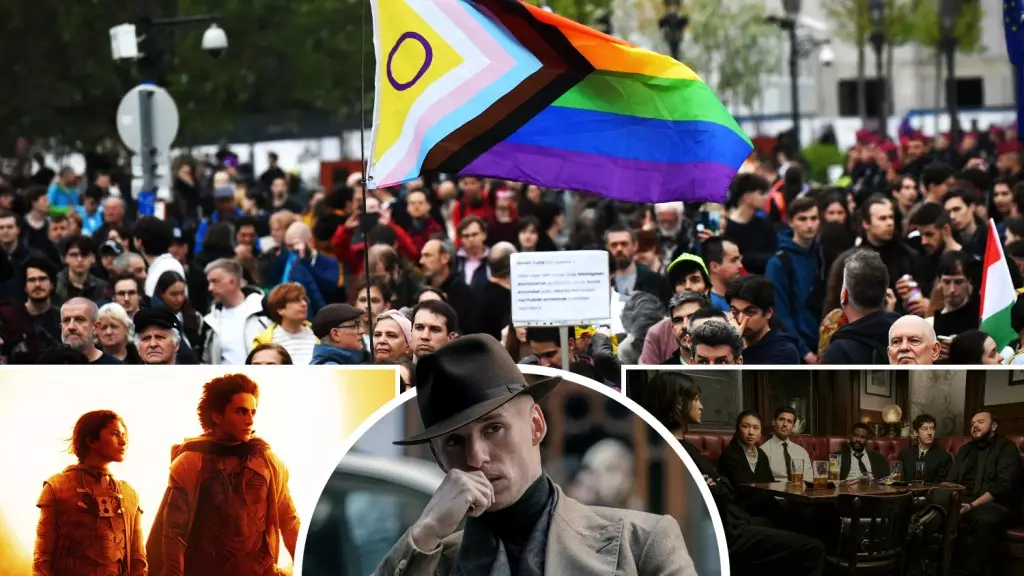In recent years, Hollywood has increasingly found itself at a crossroads where financial interests clash with socio-political values, raising questions about the ethics of filming in countries that adopt regressive policies. The past controversies surrounding North Carolina’s bathroom bills serve as a cautionary tale for studios weighing their options in the wake of similar, albeit more severe, developments in Hungary. As production companies flock to Hungary—an attractive filming destination offering irresistible tax incentives—many now find themselves grappling with the ethical implications of their presence in a nation that is actively implementing anti-LGBTQ+ laws.
The decision by companies like Netflix to move “Outer Banks” out of North Carolina was not merely a business decision; it was a powerful statement against intolerance. Similarly, Hollywood’s engagement with Hungary, however lucrative, signals a potential compromise of ethics in favor of revenue. This prevailing tension prompts contemplation: what price can and should creativity pay for financial advantage?
Hungary’s Legislative Discrimination
The recent constitutional amendment in Hungary that bans LGBTQ+ public gatherings and restricts the depiction of homosexuality to minors epitomizes the growing challenges for LGBTQ+ rights globally. With Prime Minister Viktor Orbán’s government leading the charge in instituting these laws, the film sector in Hungary, once heralded for its diverse creative output, now risks becoming synonymous with discrimination. Strikingly, the fact that two nominees for Best Picture have been filmed there—“Dune: Part Two” and “The Brutalist”—calls into question the moral narrative that these films intend to espouse.
While the international community watches this legislative encroachment with concern, Hollywood’s silence reveals a troubling complicity. The entertainment industry, which often champions progressive ideals, seems willing to overlook Hungary’s legislative transgressions in favor of its lucrative financial returns. Studios have been quiet, suggesting either a calculated risk assessment prioritizing profit, or a misjudgment regarding the rising intensity of social issues that resonate with audiences.
Cost Versus Conscience
One cannot ignore the appealing financial landscape Hungary provides: its competitive tax credits, estimated at 30%, make it hard for studios to turn away. With many productions already deeply invested, relocating could incur exorbitant costs. The allure of immediate tax returns stands in stark contrast to the more abstract outcomes of social justice efforts. “Something draconian would have to happen to the tax credit for Hollywood to abandon the country,” one producer stated, emphasizing the industry’s clear prioritization of fiscal security over ethical imperatives.
Yet, this pragmatic mentality begs deeper questioning. Do filmmakers—creatives who often envision worlds of tolerance and diversity—become complicit in the erasure of those values through mere economic dependency? Will enduring financial incentives trump the potential harm of fostering an environment hostile to human rights? If directors and actors refuse to work in oppressive environments, might they catalyze authoritative shifts or, at the very least, spark more public awareness?
Hollywood’s Historical Context
Comparisons with Hollywood’s previous response to North Carolina’s controversial laws may offer guidance. In a scenario reminiscent of the social backlash faced by North Carolina, one might assume that similar public outrage would spur a proactive boycott in Hungary. However, many insiders are skeptical regarding the efficacy of protests given that Prime Minister Orbán has successfully cemented his control for over a decade. Acknowledging that similar discriminatory patterns emerged in different pockets of the United States complicates the conversation; when members of a target group are marginalized domestically, how can filmmakers credibly champion causes abroad?
It is also pertinent to examine how a boycott worked for North Carolina—ultimately shifting public sentiment and leading to changes in law. However, the situation in Hungary carries the distinct burden of a government that actively seeks to further entrench its policies, creating a far less optimistic outlook. Admittedly, the ideological alignment of Orbán and his policies with U.S. political shifts is disheartening, revealing a tapestry of interlinked factors that nourish intolerance both locally and globally.
Future Implications for Production
The ramifications of the current scenario extend beyond economic loss as they intersect with the careers of countless local artists and technicians reliant on an active film industry. A voice within this network points to a local sentiment of despair, noting, “The local production services and arts crew are very upset; they know people aren’t going to come back here to shoot movies.” This disillusionment reflects how political actions ripple through cultural sectors, threatening not just livelihood but also creative expression.
In a world where social media amplifies voices and ethical consciousness is increasingly paramount to brand reputation, how long will Hollywood studios stick to business as usual in countries like Hungary? The film industry sits at an essential junction, as it must now reflect deeply on what defines its core values. The path forward will test Hollywood’s courage to choose between profit and principle—an imperative decision that could reshape the industry’s ethical landscape for years to come.
